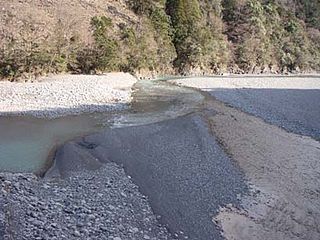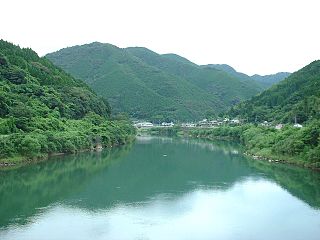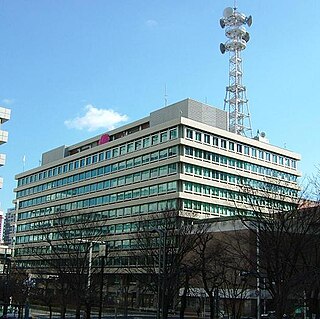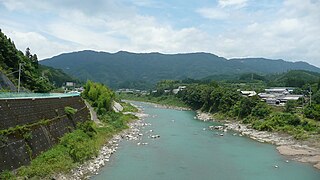
Ibaraki Prefecture is a prefecture of Japan located in the Kantō region of Honshu. Ibaraki Prefecture has a population of 2,871,199 and has a geographic area of 6,097.19 square kilometres. Ibaraki Prefecture borders Fukushima Prefecture to the north, Tochigi Prefecture to the northwest, Saitama Prefecture to the southwest, Chiba Prefecture to the south, and the Pacific Ocean to the east.

Pipistrellus is a genus of bats in the family Vespertilionidae and subfamily Vespertilioninae. The name of the genus is derived from the Italian word pipistrello, meaning "bat".

The Ōi River is a river in Shizuoka Prefecture, Japan.

The Shinano River, known as the Chikuma River in its upper reaches, is the longest and widest river in Japan and the third largest by basin area. It is located in northeastern Honshu, rising in the Japanese Alps and flowing generally northeast through Nagano and Niigata Prefectures before emptying into the Sea of Japan.

An abutment is the substructure at the ends of a bridge span or dam supporting its superstructure. Single-span bridges have abutments at each end which provide vertical and lateral support for the span, as well as acting as retaining walls to resist lateral movement of the earthen fill of the bridge approach. Multi-span bridges require piers to support ends of spans unsupported by abutments. Dam abutments are generally the sides of a valley or gorge, but may be artificial in order to support arch dams such as Kurobe Dam in Japan.

The Kuma River is a river in Kumamoto Prefecture, central Western part of Kyūshū, Japan. It is sometimes referred as Kumagawa River. It is the longest river in Kyushu, with the length of 115 km long and has a drainage area of 1,880 km2 (730 sq mi). The tidal flat of the Kuma River estuary is approximately 1000 hectares.

Saru River is a river in Hokkaidō, Japan.

Malampuzha Dam is the largest dam and reservoirs in Kerala, located near Palakkad, in the state of Kerala in South India, built post independence by the then Madras state. Situated in the scenic hills of the Western Ghats in the background it is a combination of a masonry dam with a length of 1,849 metres and an earthen dam with a length of 220 metres making it the longest dam in the state. The dam is 355 feet high and crosses the Malampuzha River, a tributary of Bharathappuzha, Kerala's second longest river. There is a network of two canal systems that serve the dam's reservoir of 42,090 hectares.

The Tenryū River is a river in central Honshū, Japan. With a length of 213 km (132 mi), it is Japan's ninth longest river.

Chubu Electric Power Co., Inc., abbreviated as Chuden in Japanese, is a Japanese electric utilities provider for the middle Chūbu region of the Honshu island of Japan. It provides electricity at 60 Hz, though an area of Nagano Prefecture uses 50 Hz. Chubu Electric Power ranks third among Japan's largest electric utilities in terms of power generation capacity, electric energy sold, and annual revenue. It is also one of Nagoya's "four influential companies" along with Meitetsu, Matsuzakaya, and Toho Gas. Recently, the company has also expanded into the business of optical fibers. On January 1, 2006, a new company, Chubu Telecommunications, was formed.

Kadoma-minami Station is an underground metro station located in the city of Kadoma, Osaka, Japan, operated by Osaka Metro.

Syringa reticulata, the Japanese tree lilac. is a species of flowering plant in the family Oleaceae native to eastern Asia, which is grown as an ornamental in Europe and North America.

The Shō River has its source in Mount Eboshi in the Shōkawa-chō area of Takayama, Gifu Prefecture, Japan. After flowing for 115 km (71 mi) through the northern part of Gifu Prefecture and the western part of Toyama Prefecture, it empties into Toyama Bay.
Niikappu River is a river in Hokkaidō, Japan.

The Gōnokawa River is a river that runs through Hiroshima and Shimane prefectures in Japan. It is the largest river in the Chūgoku region. It is also called the Gōgawa River and, in Hiroshima, the Enokawa River.

Mimi River is a river of Japan. It flows through the Miyazaki Prefecture. There is cascade of six dams built on the river with two dams in the upstream basin of the Tsukabaru Dam and three dams on the downstream.

Natsuiro Kiseki is a Japanese anime television series produced by Sunrise and directed by Seiji Mizushima. The series aired on MBS between April and June 2012. A manga adaptation illustrated by Tatsuhiko was serialized in Square Enix's Young Gangan magazine between January 2012 and March 2013.
Hanak's dwarf bat or Hanak's pipistrelle is a species of bat only found in Cyrenaica, Libya and Crete, Greece.

The Tunnel to Summer, the Exit of Goodbyes is a Japanese light novel written by Mei Hachimoku and illustrated by Kukka, published by Shogakukan under its Gagaga Bunko imprint in July 2019. A manga adaptation, titled The Tunnel to Summer, the Exit of Goodbye: Ultramarine and illustrated by Koudon, started in Shogakukan's seinen manga magazine Monthly Sunday Gene-X in July 2020. Both the light novel and manga are licensed in North America by Seven Seas Entertainment. An anime film adaptation by CLAP will premiere in September 2022.

















